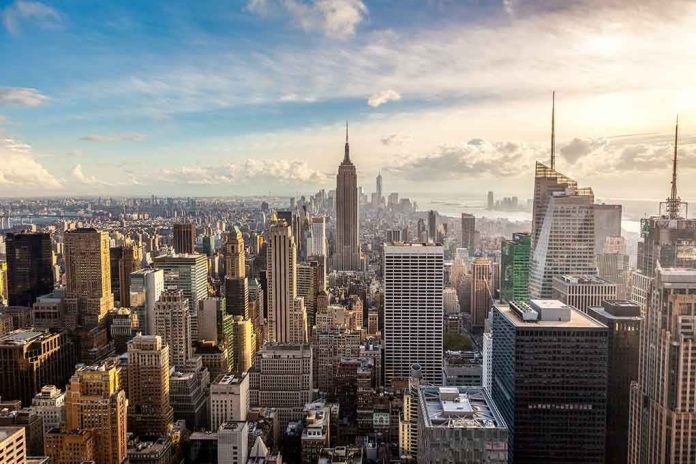
Eight illegal migrant gang members seized control of a notorious Queens red-light district, terrorizing residents with violence and extortion, until a federal sting finally brought their reign to a crashing end—so why did it take this long, and who let it happen in the first place?
At a Glance
- Eight members of the violent 18th Street Gang’s “54 Tiny Locos” clique, most in the U.S. illegally, arrested in Queens after years of terrorizing Roosevelt Avenue.
- The gang filled a power vacuum left by a prior crackdown, exploiting a district notorious for prostitution, drugs, and unregulated street crime.
- Local leaders, business owners, and residents repeatedly pleaded for action as criminal activity surged—while progressive politicians offered little more than lip service.
- Federal agencies collaborated in a sweeping bust, exposing the consequences of open-border policies and unchecked urban disorder.
The Roosevelt Avenue Crisis: Turning an American City into a Lawless Playground
For years, the two-mile stretch of Roosevelt Avenue in Jackson Heights, Queens, has been everything the left says doesn’t exist in America: an actual red-light district, openly ruled by crime, prostitution, and gang violence. Locals didn’t have to watch Netflix crime dramas—they had front-row seats to the real thing, thanks to the 18th Street Gang’s “54 Tiny Locos” clique, which seized control after a previous gang was run off. This wasn’t just street-level thuggery. These criminals brought a transnational playbook: drugs, extortion, fake IDs, and a climate of fear that would make a third-world dictator jealous.
Residents and business owners found themselves shaking down protection money just to keep their doors open. The area’s transformation into a “third-world flea market” wasn’t some Fox News exaggeration—it was the lived reality for Queens taxpayers. The very people who pay the bills watched as criminals, most of whom weren’t even supposed to be in this country, set up shop under the watchful gaze of politicians more interested in virtue signaling than enforcing the law. You can’t make this stuff up.
The Crackdown: Feds Step In—Finally—After Years of Pleading
On June 16, 2025, federal agents finally moved in, arresting eight suspected members of the 18th Street Gang’s “54 Tiny Locos” clique. The charges read like a greatest hits album of urban decay: racketeering, assault, drug and firearms trafficking, extortion, document fraud, and more. Seven out of eight arrested were illegal immigrants. Local law enforcement, under pressure from a furious public and a handful of determined community leaders, welcomed the backup. The feds’ message was simple: enough is enough. But let’s not kid ourselves—this didn’t happen because of some sudden burst of political will from the top. It happened because locals refused to accept living under gang rule and demanded action—loudly, persistently, in the face of indifference from their so-called “progressive” representatives.
Federal officials, including the FBI and Homeland Security, described a gang “acting with callous and cruel disregard” for Queens residents. The district attorney said the suspects had “unleashed terror” on the community through violence and predation. Community advocates, like the Restore Roosevelt Avenue coalition, hailed the bust but warned that if the root causes—open borders, lack of enforcement, and political neglect—aren’t addressed, this cycle will repeat with a new cast of criminals.
Who’s Accountable? The Real Cost of Weak Borders and Weak Leadership
The most galling part of this whole scandal is how utterly predictable it was. For years, under the Biden-Harris administration, border encounters and criminal alien arrests have shattered every record in the book, flooding American cities with migrants—some seeking a better life, but plenty bringing a criminal agenda. While the left assured us these were just “families seeking safety,” the cold, hard stats told a different story: over 140,000 border encounters per month, a criminal non-detained docket of 650,000, and nearly two million “gotaways” roaming free. These aren’t just numbers on a bureaucrat’s spreadsheet. They’re real criminals, showing up in places like Queens and turning neighborhoods into war zones.
The Roosevelt Avenue saga is a direct consequence of policies that prioritize ideology over public safety. Law-abiding citizens were left to fend for themselves while politicians like Alexandria Ocasio-Cortez busied themselves with social media stunts and blaming “systemic injustice” for every crime wave. Meanwhile, families and businesses paid the price—sometimes literally, in the form of extorted cash or violence. This is the cost of so-called “compassionate” governance: chaos on our streets, fear in our communities, and a justice system that plays catch-up after the damage is done.
What’s Next for Queens—and the Rest of America?
With the gang leaders now facing federal prosecution, Roosevelt Avenue gets a temporary reprieve, and the community breathes a sigh of relief. But anyone who thinks the danger is over is kidding themselves. History shows that unless the political class gets serious about immigration enforcement, gang displacement will simply mean another criminal outfit steps in to take over. Residents and business owners will have to keep fighting for the right to live in peace.
This episode is a warning to every American city: unchecked illegal immigration, combined with political indifference and urban disorder, is a recipe for disaster. The only way to restore order is for leaders to stand up for the law-abiding—and stop treating criminals and illegal entrants as victims. If the Roosevelt Avenue story doesn’t make that clear, nothing will.


